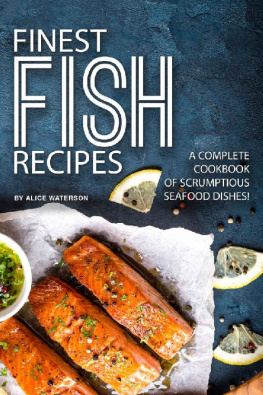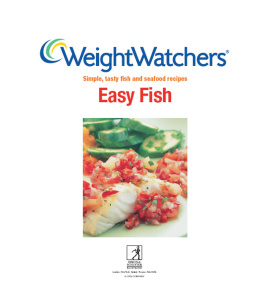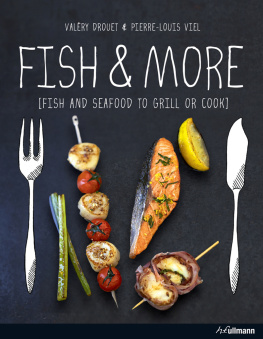Thank you to Mathew Austin for the cover image.
Part 1: The Joy of Fish

1.1: The Health Benefits
Contrary to whatever your friendly local Catholic may believe, back in the 15th or 16th century, some English king decreed that no red meat should be eaten on a Friday, only fish. This was to preserve dwindling meat stocks at the time and to promote fish consumption. If you didnt eat fish on Fridays, youd be locked up for between two and four years. Being locked up in a 16th century jail wouldnt be particularly good for your health. So its fair to say that, even in the olden days, it was good for you to eat fish.
Now we have the miracles of modern science and live in a more liberal world, but we can still prove that fish actually is truly good for you.


Heres the interesting bit behind why fish is a wonder food: as well as all the different omega oils for brain and heart health, fatty acids in fish go straight into your bodys energy production system. These fatty acids carry out electron transfers by attaching themselves to oxygen in the body and permitting energy to be produced for various chemical processes within it.
Consuming fish oil helps combat fatigue and increases mental and physical capacity. Omega-3 increases your powers of concentration as much as it does your energy levels. The benefits of the good oils and fats in fish far outweigh any trace chemicals present in the water in which they have lived.

Our brains are rich in docosahexaenoic acid (DHA); Omega-3 fatty acids contain this. Therefore, there is scientific fact in the old saying, Fish is good for the brain.
The Omega-3 fatty acid in fish has been proven to protect against cardiovascular diseases. It reduces blood pressure and cholesterol in the blood. In addition, fish oils reduce life-threatening post-heart-attack heart arrhythmia. The major risk in rheumatoid arthritis is the wearing of the joints, leading to irreparable damage.
It has been proven that a diet rich in Omega-3 fatty acids prevents arthritis and reduces discomfort in swollen and sensitive joints. So fish keeps you well-oiled throughout your life. At the same time, Omega-3 fatty acids have an anti-inflammatory, infection preventing function.
In short, a fish-rich diet can help:
- Rheumatoid arthritis
- Osteoarthritis
- Ulcerative colitis
- Lupus
- It protects myelin (the material surrounding nerve cells)
- Glaucoma
- Multiple sclerosis
- Osteoporosis
- Diabetes
- Migraine
- Anorexia
- Burns
- Problems concerning skin health
- Helping with inflammatory disorders and
- Strengthens the immune system

We eat fish in our family at least three times a week. My kids would complain loudly if I dared attempt more. Whether its my currently 13 year old Sam saying, I really must protest, Father; not those dastardly wild sea bass fillets again! or my 8-year-old Rosie chiming in, Im living in a turmoil of discontent here, Father. Im sick of monkfish wrapped in pancetta. I hate you! Their little brain boxes have no idea how lucky they are.
Fish are also one of the only natural wild protein sources left. Most things we eat are farmed, with goodness knows whats been added to the animal when it was alive, and after slaughter to make it last longer in the store.
Pregnancy
Expectant mothers are sometimes fearful of eating fish and seafood during pregnancy. There are no dangers with the fish, as long as it is really fresh. If you buy from a supermarket, you have no idea of the fishs provenance. If you buy it from your fishmonger, you do.
1.2: First Choose Your Fish

Generally, at the start of a conversation with a new customer, they might say, Si , whats your favourite fish?
The answer is: I dont have one!
Its a bit like someone asking, Whats your favourite song? It really depends on your mood. But with fish, it totally depends on the time of year because:
Every species of fish and shellfish is seasonal.
On a cold drizzly February evening, after a quieter day, watching the waves come over the Cobb, Id love a steaming plate of a particularly creamy, smokey fish pie.
As the weather warms up in late May or early June at the very start of their season, top of my list would be barbecued sea-trout with some simply boiled samphire grass. You know summers on the way with those tastes.
On a late summers evening, my wife and I really enjoy raw mackerel Tataki, an Asian-spiced dish brought to the UK by Val Warner (recipe available further on in this book).
There are so many ways of preparing and cooking so many fish that we never ever get bored of it. But if you truly want to act responsibly and source sustainably, buy whats in season. The seasonality chart just along a bit will guide you but this is prepared for the southern coasts of the UK. Theres quite a big difference between water temperatures from north to south. This guide reflects that, as most species are migratory and swim to where the water temperature is ideal for them at any particular time. If you live further north, the waters will warm later so the fish will be in those waters later in the year.
Theyre scarce now, madam.
Theres a lot of confusion amongst supermarket fishmongers. They dont have a clue about seasonality because they dont buy first hand. So many customers come in to my shop and exclaim how glad they are to see and buy species they thought were long extinct, because some Saturday girl on a supermarket counter had informed them otherwise.















